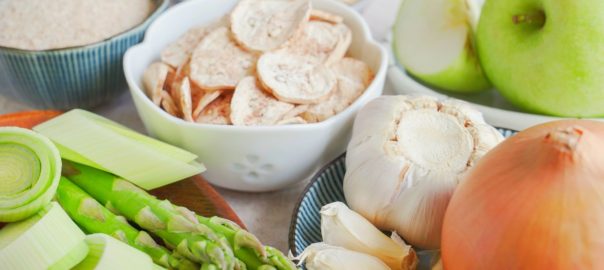You may have seen the term prebiotics in the news and thought it was a typo. After all, at this point almost everyone knows about probiotics, those beneficial bacteria that are supportive for your health. But what exactly are probiotics? And what's the difference between the two?
Probiotics are bacteria that you definitely want in your gut for the health benefits they confer. They are contained in foods like yogurt, pickles (the refrigerated ones), olives, some cheeses and a number of exotic foods such as miso and kimchi, as well as food additives. These bacteria help in the treatment of problems like diarrhea and irritable bowel syndrome and in keeping your colon healthy.
But probiotics need food to survive and multiple. The cells that line the colon (colonocytes) and the good bacteria work together to protect you from invasion of harmful germs into your body, thereby preventing disease. They depend on the nourishment gleaned from food that is not digested in the stomach and small intestine. That's where prebiotics come in.
Those indigestible foods are the prebiotics, foods that serve as energy sources for the probiotics and good bacteria in the colon. Prebiotics contain indigestible starches and polysaccharides that ferment in the upper gut. The products of this fermentation are the food sources for the probiotics.
Health Benefits from Prebiotics
- Improvement in diarrhea, both caused by bacteria and by antibiotics.
- Relief from the symptoms of both diarrhea and constipation in irritable bowel syndrome.
- Improvement in the symptoms and decreased inflammation in inflammatory bowel disease, such as Crohn's and ulcerative colitis.
- Protection against cancer of the colon by keeping the colonocytes healthy.
- Aids in lowering cholesterol levels in the blood.
- Helps absorption of minerals such as calcium and magnesium.
Your health depends a lot on what you eat. Even if you are young and healthy, consuming a diet of healthy foods will help to keep your body strong and vigorous. If you have any type of chronic disease, or if you are getting older, your diet becomes even more important.
They say laughter is wonderful medicine but so is food. Start treating your body to the foods it needs and deserves.
Prebiotics Foods
- Onions - Both raw and cooked.
- Bananas - Try to get them slightly unripe.
- Asparagus - Tasty and good for you.
- Oats - Whole oats are available in cereals.
- Apples - They also reduce cholesterol.
- Wheat bran - Also available in cereals.
- Chicory root - Sometimes used as a coffee substitute.
- Leeks - Also an excellent source for vitamin K.
- Dandelion greens - They make a great salad.
- Jerusalem artichoke - Either raw or cooked.
- Radishes - Great in salads.
- Cabbage - Preferably raw, but also as sauerkraut.



